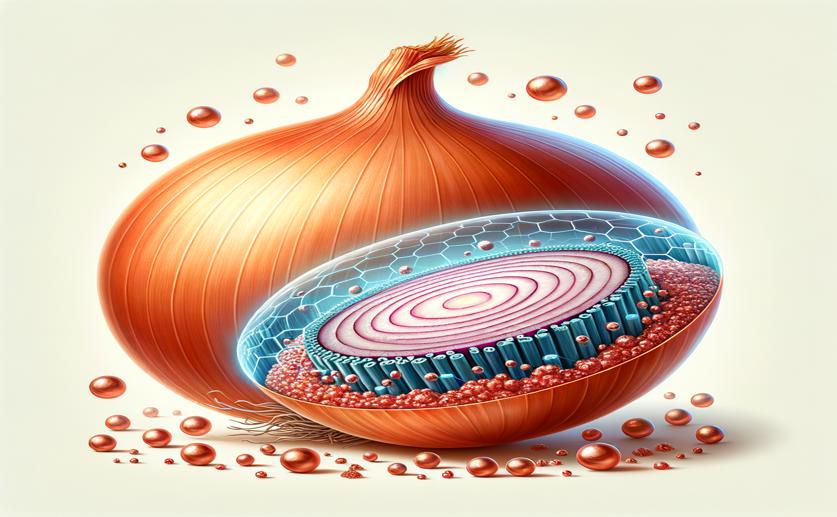Improving Onion Quality and Safety with Copper Nanoparticles

Image Source: Natural Science News, 2024
Key Findings
- The study by the University of Agriculture, Faisalabad, found that copper nanoparticles (Cu NPs) significantly enhance onion growth
- Applying Cu NPs at 15 mg kg-1 increased plant height by 48%, leaf length by 37%, and leaf area by 72%
- Cu NPs also reduced chromium uptake in onion plants by 46% in roots, 68% in leaves, and 92% in bulbs, lowering health risks from chromium consumption
Chromium (Cr) contamination in soil presents serious health risks, particularly in regions with extensive industrial activities. A recent study by the University of Agriculture, Faisalabad, explores the potential of copper nanoparticles (Cu NPs) to enhance onion growth while reducing chromium uptake in these plants[1]. This research is significant as it not only aims to improve crop yield but also to mitigate health risks associated with chromium consumption.
Chromium, particularly in its hexavalent form (Cr(VI)), is highly toxic to plants, causing oxidative stress, disrupting nutrient uptake, and hindering photosynthesis and metabolism[2]. However, mild concentrations of Cr(VI) have been shown to promote growth and root development under specific conditions[2]. The current study builds upon these findings by investigating how Cu NPs can further optimize plant growth and reduce chromium absorption.
The study demonstrated that applying Cu NPs at a concentration of 15 mg kg-1 significantly improved various growth parameters of onion plants. These improvements included increases in plant height (48%), leaf length (37%), fresh and dry weight of roots (61% and 70%, respectively), fresh and dry weight of bulbs (52% and 59%, respectively), and leaf area (72%). Additionally, the number of onion leaves per plant increased by 60%, and photosynthetic pigments such as chlorophyll a, chlorophyll b, and carotenoids saw substantial increases (42%, 36%, and 40%, respectively). These enhancements in growth metrics are crucial for agricultural productivity.
Moreover, the study found a significant reduction in chromium uptake by the plants when Cu NPs were applied. Chromium levels in the roots, leaves, and bulbs decreased by 46%, 68%, and 92%, respectively, under Cr toxicity conditions. This reduction is vital for minimizing the health risks associated with consuming chromium-contaminated plants. The health risk assessment parameters, including average daily intake (ADI), non-cancer risk (NCR), and cancer risk (CR), were all significantly lower in plants treated with Cu NPs, indicating reduced potential health hazards.
Previous research has shown that biochar can also reduce the bioavailability of heavy metals like cadmium, copper, lead, and zinc in soil[3]. Similarly, the combined use of biochar and gravel sand with metal-tolerant microbes has been effective in reducing cadmium stress in plants and improving their growth and nutritional quality[4]. The current study extends these findings by demonstrating that Cu NPs can be a potent alternative or complementary strategy for reducing heavy metal uptake in plants.
The mechanisms behind the effectiveness of Cu NPs in enhancing plant growth and reducing chromium uptake are multifaceted. Copper nanoparticles are known for their excellent adsorbent properties, which likely contribute to the immobilization and reduced bioavailability of chromium in the soil. Additionally, the nanoparticles may enhance the plant's physiological and biochemical processes, as evidenced by the increased levels of photosynthetic pigments and other growth parameters.
The study's results are promising for agricultural practices, especially in areas with heavy metal contamination. By applying Cu NPs at an optimal concentration of 15 mg kg-1, farmers can significantly improve crop yield and quality while mitigating the risks associated with heavy metal uptake. This approach aligns with previous findings on the benefits of using biochar and other immobilizing agents to improve soil health and plant growth[3][4].
In conclusion, the research conducted by the University of Agriculture, Faisalabad, provides compelling evidence that copper nanoparticles can enhance onion growth and reduce chromium uptake, thereby offering a viable solution to the dual challenges of soil contamination and agricultural productivity. This study adds to the growing body of literature on the use of nanotechnology and other innovative strategies for sustainable agriculture and environmental remediation.
HealthBiochemPlant Science
References
Main Study
1) Enhancing chromium resistance and bulb quality in onion (Allium cepa L.) through copper nanoparticles and possible health risk.
Published 15th August, 2024
Journal: BMC plant biology
Issue: Vol 24, Issue 1, Aug 2024
Related Studies
Related Articles





 25th May, 2024 | Jenn Hoskins
25th May, 2024 | Jenn Hoskins